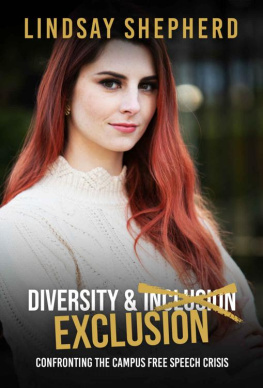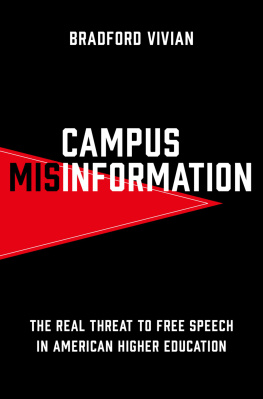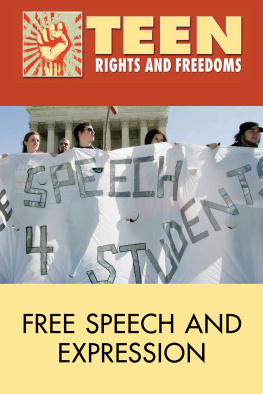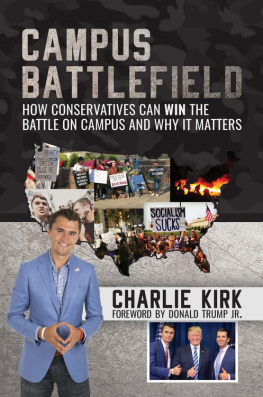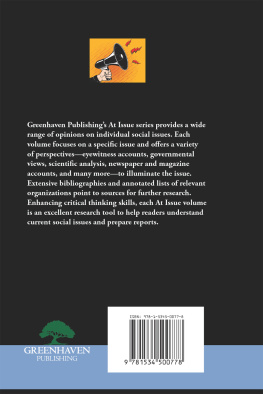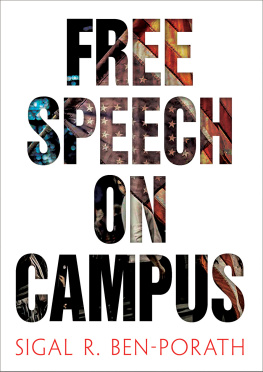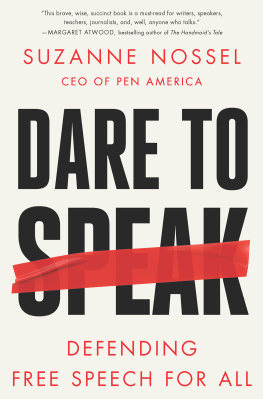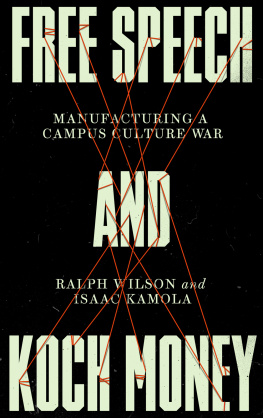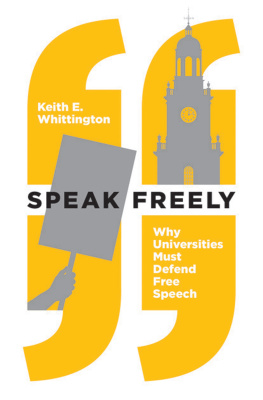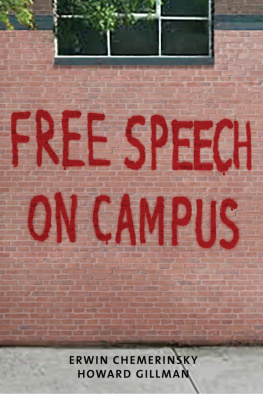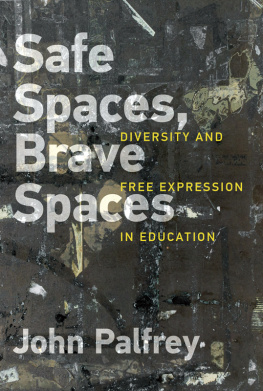Lindsay Shepherd - Diversity and Exclusion: Confronting the Campus Free Speech Crisis
Here you can read online Lindsay Shepherd - Diversity and Exclusion: Confronting the Campus Free Speech Crisis full text of the book (entire story) in english for free. Download pdf and epub, get meaning, cover and reviews about this ebook. year: 2021, publisher: Magna Carta, genre: Art. Description of the work, (preface) as well as reviews are available. Best literature library LitArk.com created for fans of good reading and offers a wide selection of genres:
Romance novel
Science fiction
Adventure
Detective
Science
History
Home and family
Prose
Art
Politics
Computer
Non-fiction
Religion
Business
Children
Humor
Choose a favorite category and find really read worthwhile books. Enjoy immersion in the world of imagination, feel the emotions of the characters or learn something new for yourself, make an fascinating discovery.
- Book:Diversity and Exclusion: Confronting the Campus Free Speech Crisis
- Author:
- Publisher:Magna Carta
- Genre:
- Year:2021
- Rating:4 / 5
- Favourites:Add to favourites
- Your mark:
- 80
- 1
- 2
- 3
- 4
- 5
Diversity and Exclusion: Confronting the Campus Free Speech Crisis: summary, description and annotation
We offer to read an annotation, description, summary or preface (depends on what the author of the book "Diversity and Exclusion: Confronting the Campus Free Speech Crisis" wrote himself). If you haven't found the necessary information about the book — write in the comments, we will try to find it.
Diversity and Exclusion: Confronting the Campus Free Speech Crisis — read online for free the complete book (whole text) full work
Below is the text of the book, divided by pages. System saving the place of the last page read, allows you to conveniently read the book "Diversity and Exclusion: Confronting the Campus Free Speech Crisis" online for free, without having to search again every time where you left off. Put a bookmark, and you can go to the page where you finished reading at any time.
Font size:
Interval:
Bookmark:
DIVERSITY AND EXCLUSION:
CONFRONTING THE CAMPUS FREE SPEECH CRISIS
Copyright 2021 by Lindsay Shepherd
All rights reserved.
ISBN: 978-0-9939195-7-2
Magna Carta
Contents
A number of people have encouraged me over the years to write a book detailing my experiences as a graduate student and teaching assistant at Wilfrid Laurier University, but I was resistant to it. Writing a book about myself and something I went through, as opposed to neutrally examining another subject, seemed too self-indulgent.
I vowed to instead write a book analyzing the ideology of diversity, equity, and inclusion in Canada, and how these weaselly concepts manifest themselves in academia, politics, media, and culture. As I was writing that book, I realized there was no way to avoid telling the story of the Laurier affair: so much of my knowledge and insight regarding diversity ideology, the suppression of open inquiry, and modern threats to free expression stemmed from my firsthand experiences at Laurier during the fall of 2017.
Okay, fine, I said to myself, Ill just briefly talk about Laurier in the introduction, before I get on with the rest of the book.
But there was no way the intricacies of the 20172018 Laurier controversy could be recounted in only a few pages.
This book before you is the one that needed to be written, for two reasons. Firstly, I have always enjoyed insider accounts of media-hyped events, and Im guessing you and I share that quality. The second reason is more functional: documentation. Many have squinted at me when I tell them my name, remarking that it sounds somewhat familiar. After a moment theyll exclaim that I am the TA who got fired for playing a Jordan Peterson video in class! (Well, not quite). They will then add, I dont really know the full story though, what actually ended up happening?
This is that story.
I didnt apply to graduate school because I was afraid of entering the full-time workforce, or because I was lacking something else to do. I also didnt care at all whether pursuing an MA would be some sort of smart career move that would look good on my resume and get me a higher salary.
In late 2016, when the end of my time as an undergraduate student was on the horizon, I applied to graduate school purely out of a desire for intellectual fulfillment and a love of reading, learning, and expanding my mind. Most of the potential career paths I was considering teaching English to international students, applying to be a public relations officer with the Canadian Forces, or opening a small shop selling used clothing and goods didnt require a graduate degree. But I figured I might eventually try to enter academia as a profession, because I saw the acquisition of knowledge and exploration of ideas as the most worthy pursuits in life.
I lived a humble existence in my bachelor suite in Burnaby, British Columbia, a 15-minute bus ride away from Simon Fraser University, where I was completing my BA in Communication and Political Science. I paid $735 a month in rent utilities, internet, and cable included. There were raccoons living in my roof I would hear their little feet scrambling around above my ceiling but I was reluctant to tell my landlord about them. I didnt want the little raccoon family to be hurt or killed. My housemates, who lived in a separate suite, were somewhat heavy drinkers, so whenever they left beer cans and wine bottles in our recycling bin, I would promptly pluck them out and bike down to the bottle return depot for a bit of cash.
I didnt have an oven or dishwasher, and my fridge was usually bare, aside from a few bottles of near-empty hot sauces. But there was little cooking or cleaning to be done, as I was hardly ever home. I was either in class, writing my papers at the library, studying at the nearby 24-hour Tim Hortons, or working.
Throughout my undergraduate years, I juggled two to four part-time jobs at a time. I had been the manager of an artisan gelato shop; the events and promotions assistant for the SFU Recreation Centre; a program coordinator at a non-profit organization; and a childminder at a gym. I always downplayed how much I worked, since I didnt think people would believe me anyways. It was manageable, though: as the gelato shop manager, I could decide my own hours and work them around my classes, the SFU Recreation job was only five hours a week, the childcare facility job was only on Saturday and Sunday, and the program coordinator job was casual and you could sign up for your own shifts. My class readings were done on the bus to and from work and school. If I couldnt get a seat because the bus was too full, I would read standing up, my elbow hooked around a pole as I held my papers in one hand and a pink highlighter in the other.
I didnt get enough sleep at night, so if there happened to be a day where I had an hour or two of free time between classes, I would drift off in one of the comfy lounge chairs on campus. Sometimes, on my way home from working an evening shift, I would be lucky enough to get a seat on the bus where I could put my hood up and lean my head against the window for a half-hour snooze. I missed my stop countless times because of this, but I would sometimes miraculously wake up right at my stop and fly out the doors just before they closed shut. About once a week, I would drop into an on-campus yoga class, which I could attend for free as a recreation centre employee, and Id spend the final five-minute savasana period making a mental checklist of all the things I needed to do that week (precisely what the yoga instructors tell you not to do during savasana). In one yoga class during a particularly busy week, I fell right asleep for that five minutes, my head resting on a cork yoga block.
I decided to apply only to graduate schools in Ontario, as I had never spent much time in the province. I had previously lived in both Montreal and Halifax I moved to Halifax a month after graduating high school at 17 to attend Dalhousie University, but had a hard time securing part-time work to fund my studies. I transferred to Concordia University in Montreal, moving to a dingier neighbourhood in the borough of Verdun, also known as Verdump. I waitressed at a Persian restaurant while taking courses in a bilingual policy studies program before deciding I missed my boyfriend at the time too much and moved back to BC.
Since my major at SFU was in Communication, it made sense to apply to graduate programs in the same field. People made fun of Communication Studies for being intellectually lightweight, or the degree of choice for scholarship football players, but I liked engaging in the analysis of media, technology, and modern Western culture. Though one of my friends, a geography student who had taken a course in Communication Studies, once told me that her impression of Communication students was that they are ambitious but ambitious for things that dont matter. I agreed: it was always a bit off-putting to hear a classmate express that their dream job was being a social media engagement manager for Lululemon.
I applied to only two MA programs. The first was the MA Communication and New Media program at McMaster University in Hamilton. I cringed a bit when I applied: one of my professors had just happened to mention in class that new media was a terribly outdated term for social media, explaining that no one in the field uses the term anymore. Next, I filled out my application to Wilfrid Laurier University. While looking at an alphabetical list of their MA programs, I saw a program titled Cultural Analysis and Social Theory (CAST) listed right after the Communication Studies program. It sounded intriguing more complex and philosophical than Communication Studies. At the last minute, I applied for CAST instead of Communication Studies. With my writing samples submitted and references in order, all I could do for the next couple months was wait.
Font size:
Interval:
Bookmark:
Similar books «Diversity and Exclusion: Confronting the Campus Free Speech Crisis»
Look at similar books to Diversity and Exclusion: Confronting the Campus Free Speech Crisis. We have selected literature similar in name and meaning in the hope of providing readers with more options to find new, interesting, not yet read works.
Discussion, reviews of the book Diversity and Exclusion: Confronting the Campus Free Speech Crisis and just readers' own opinions. Leave your comments, write what you think about the work, its meaning or the main characters. Specify what exactly you liked and what you didn't like, and why you think so.

